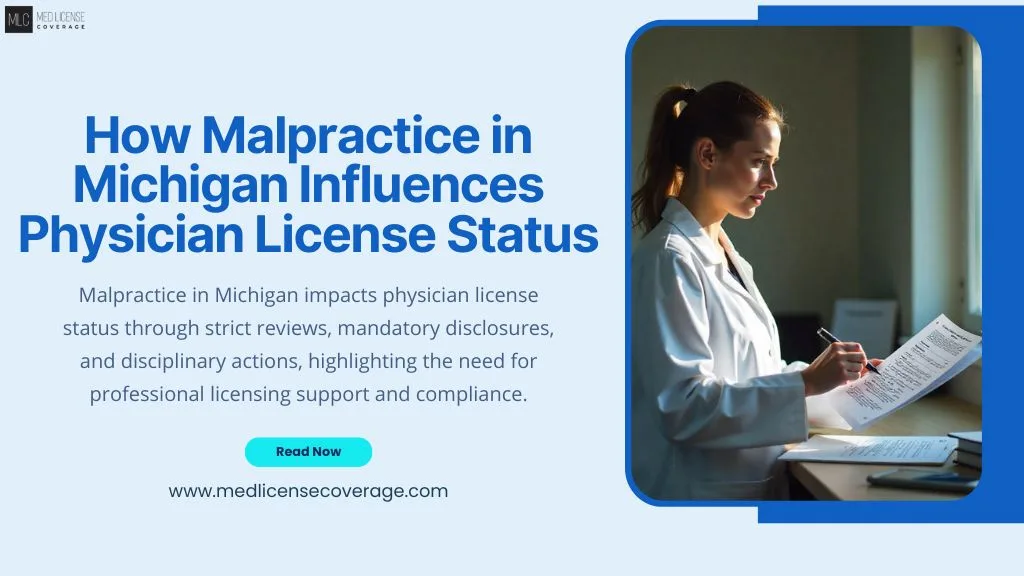Malpractice in Michigan creates lasting effects on physician license status. Oversight from the Michigan Board of Medicine ensures all misconduct is evaluated. Verified incidents lead to delays, investigations, or disciplinary actions. Each case becomes part of the public record, affecting future renewals and hospital privileges.
Michigan’s Oversight Framework for Malpractice
The Michigan Board of Medicine reviews all malpractice cases. Every report undergoes credential checks and legal analysis. Confirmed negligence triggers hearings, documentation audits, and peer evaluations. Depending on severity, license restrictions, probation, or revocation may follow.
Mandatory Reporting Requirements in Michigan
Michigan law mandates reporting of all settlements, judgments, or malpractice-related lawsuits. Medical institutions, insurers, and hospitals must file these with the board. Failure to disclose or late filings result in penalties, affecting the license holder’s standing. Transparency is a legal obligation in the state.

Evaluation Process of Malpractice Claims
Malpractice in Michigan undergoes a multi-step evaluation. Boards assess the nature of the violation, past patterns, and overall risk. Isolated events may have minimal effects. Repeated errors or high-risk specialties trigger deeper assessments.
Malpractice and License Suspension
Serious malpractice in Michigan can lead to license suspension. The board imposes this if public safety appears compromised. Suspension remains until resolution through corrective action or legal conclusion. Interim monitoring may occur under supervision programs.
Physician License Reinstatement Service Role
Physician License Reinstatement Service assists in organizing appeal documents. These services prepare formal petitions, monitor deadlines, and collect compliance records. Boards expect full remediation proof before lifting a suspension. A structured approach improves reinstatement outcomes.
Effects on New Applications and Renewals
Malpractice in Michigan slows down new license applications. Renewals face additional board scrutiny. Medical professionals must submit documentation of past incidents, board responses, and corrective actions. Ongoing investigations delay application results.
Board Hearings and Disciplinary Outcomes
Each malpractice case includes a formal hearing process. The Michigan board evaluates legal testimony, expert opinions, and patient outcomes. Depending on findings, the physician faces reprimands, fines, probation, or revocation.
Hospital Credentialing and Malpractice Impact
Malpractice history affects hospital credentialing in Michigan. Hospitals verify board records during staff appointments. Delays in credentialing reduce practice opportunities. Loss of hospital privileges often initiates a board review.
Differences in Specialty-Based Evaluations
Malpractice in Michigan affects each specialty differently. Surgeons, anesthesiologists, and emergency physicians face higher evaluation levels. Specialty-based risk analysis influences licensing decisions. Recurrent incidents increase the likelihood of license modification.
Public Disclosure and Physician Records
Michigan maintains public records of malpractice incidents. Patients and employers access disciplinary history online. This transparency increases reputational risk. Records remain accessible even after license reinstatement.
Multi-State Licensing and Malpractice History
Malpractice in Michigan affects licensing across other states. Interstate license applications require full disclosure. Boards in other regions cross-check Michigan board reports. Inconsistencies between applications lead to denials.
Legal Counsel and Board Communication
Legal representation plays a role in malpractice-related licensing. Attorneys prepare defense documents, ensure compliance with board requirements, and guide responses. Legal oversight improves the outcome of board hearings and mitigates risks.
Role of Physician Licensing Services
Physician licensing services in Michigan offer complete documentation handling. These services track records, prepare accurate files, and submit credential verification. With ongoing malpractice cases, this support ensures licensing continuity.
CME Requirements and Compliance
Michigan mandates Continuing Medical Education (CME) for license reinstatement after malpractice. Ethics courses, documentation training, and patient safety modules are common. Boards verify completion before approval.
Addressing Ongoing Investigations
Unresolved malpractice investigations in Michigan delay license decisions. The board waits for legal conclusions before making final calls. Active cases require regular updates, cooperation, and case summaries for licensing review.
Malpractice by State Variations
Michigan follows its unique standards under the Malpractice by State framework. Differences exist in how misconduct is evaluated compared to other regions. Understanding Michigan’s rules ensures compliance and proactive risk management.
Documentation Accuracy During Application
Accurate medical license applications reduce risks of delays. Michigan boards check each section for completeness. Any omission, especially involving malpractice, causes setbacks. Full transparency is vital for timely approvals.
Hospital Credentialing by State and Malpractice History
Credentialing processes vary across Michigan hospitals. Each facility checks malpractice records before granting privileges. Lack of disclosure or unresolved issues causes delays in access to hospital systems.
Ethics Evaluations in Licensing Process
The board evaluates ethical behavior as part of the licensing process. Malpractice cases involving consent, honesty, or neglect receive deeper scrutiny. Ethics training is often required before reinstatement.
Impact of Malpractice on Career Opportunities
Malpractice in Michigan affects more than licenses. Employment offers, contracts, and hospital appointments decline after severe cases. Rebuilding a professional reputation takes time and requires documented progress.
Use of Technology in License Management
Digital portals streamline license applications and renewals. Malpractice details are uploaded through these platforms. Technology ensures better tracking, but errors in uploads or omissions cause delays or rejections.
Physician License Reinstatement Procedures
After license suspension, reinstatement begins with a formal application. Documentation must include compliance proof, board-mandated education, and malpractice history. Submissions are reviewed during board hearings before decisions are made.
Recovery From Malpractice Impact
Recovery involves:
- Completing board-ordered programs
- Gathering expert reference letters
- Filing updated reports regularly
- Submitting petitions for reconsideration
Each step shows growth and supports licensing restoration.
Best Practices for Preventing Licensing Issues
Preventative steps include:
- Maintaining accurate records
- Communicating clearly with patients
- Updating board-mandated training
- Using physician licensing services
This helps reduce malpractice and protects license status in Michigan.
Conclusion
Malpractice in Michigan influences physician license status across multiple areas. From suspension to credentialing delays, every step requires compliance. The board demands full transparency and accurate documentation. Physician licensing services support professionals in managing these challenges. They guide reinstatement, complete records, and ensure ethical compliance. Understanding state-specific malpractice rules improves success in licensing and career stability.







